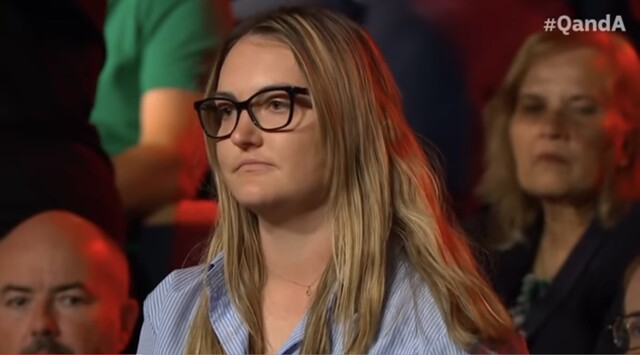By Afraa Kori
Georgia Haysom is one of many young Australians being locked out of homeownership. She rents a room in Pakenham, lives within her means, and saves between $1,000 to $1,500 a month towards her house deposit.
“As a 25-year-old full time teacher, I’m doing everything right — working hard, saving where I can and trying to get ahead,” she told the panel of politicians and experts.
“But even with a stable job, I’m finding it near impossible to break into the housing market. How can young Australians like me hope to own a home when wages haven’t kept up with the cost of living?”
Georgia’s question was delivered during the 2025 ABC Q&A election special, filmed at her own school, Beaconhills College in Berwick.
Her words cut to the heart of a generational crisis — a housing market spiraling out of reach, stagnant wages, and a cost of living that continues to climb.
“The affordability is what has prevented me from buying. The deposit is one thing but it is also the serviceability of a home loan that is a major block,” she said.
While Minister for Housing & Homelessness Clare O’Neil and Shadow Minister for Social Services, NDIS, Housing & Homelessness Michael Sukkar, spoke of housing policies, Georgia felt like “neither side really answered the question”.
She has made significant sacrifices to stay on track— cutting back on going out, cancelling her gym membership, stepping away from social sports and putting travel plans on hold.
Earlier in her career, she took on weekend casual work in addition to her full-time load, but the pressure led to burnout and isolation.
“It’s very much a ‘where do you draw the line?” she said.
“Whilst you can’t stop living your life it is a conscious decision that you have to think about.”
On top of sacrifices, Georgia had to compromise. She’s now looking well beyond her preferred suburbs and is considering smaller properties like units and apartments, just to get a foot in the door.
Georgia also addressed a generational divide — the judgment and misunderstanding she often hears from older Australians.
“It’s honestly a slap in the face, I have been working and saving since I was 15 and ‘just save harder’ is not helping when wages are not keeping up with the cost of living or the housing market with massive increase in the past few years,” she said.
“Buy further out is also an unhelpful comment when even the growing outer suburbs like Pakenham have a medium of 650k and on one income this is still unachievable to young people. Yes it is cheaper than some suburbs which is why a lot of young people are looking to shift further out initially to then look at moving back in later on.”
Another frustration is when older Australians assume “young people are lazy or unwilling to work hard”.
The Australia Institute executive director, Richard Denniss agreed that neither of the major parties’ policies will substantially help people like Georgia.
“I’m sorry that in the middle of an election campaign we’re not actually talking about how we can fix that for you and so many people like you,” he shared at ABC Q&A.
Mr Denniss criticised treasurer Joe Hockey’s advice for Australians to “get a good job that pays good money” to buy a home, arguing that even those who followed that path would still be falling behind.
“If you’d been saving on an average wage for 10 years, you’d actually be $1,000 further away from a deposit on a house in Sydney today,” he shared at ABC Q&A.
“You would be $1,000 further away from the deposit because house prices are rising faster than incomes. This is not complicated, as long as house prices are rising faster than wages you can’t catch up.
“I’m sorry but it’s a cruel hoax for people to tell you that a tax break here or something or other there is going to help.”
City of Melbourne deputy mayor, Roshena Campbell sees some hope in policies like allowing first-home buyers to access superannuation and deduct loan repayments for tax purposes.
However, she raises concerns that government-led building homes could inflate construction costs further, making it even harder for those who don’t benefit directly from the programs to enter the market.
Looking ahead to the federal election in May, Georgia believes young people are voting based on hope, frustration, or just damage control.








